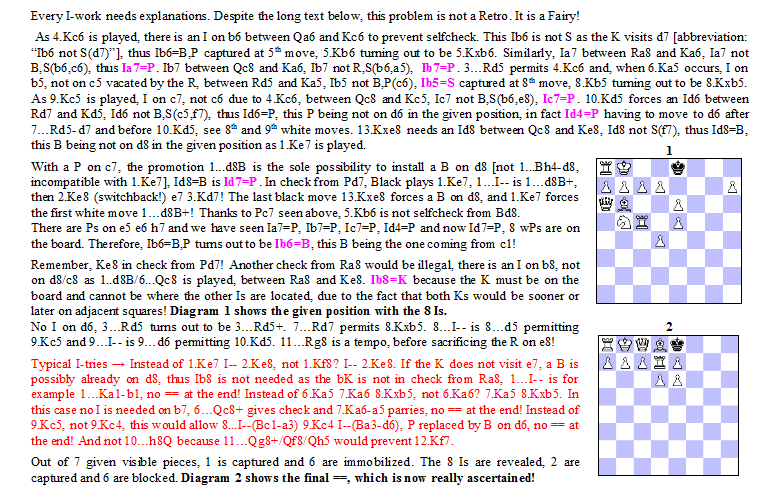|
|
Original Problems, Julia’s Fairies – 2014 (III): September – December →Previous ; →Next ; →List 2014(III) Please send your original fairy problems to: julia@juliasfairies.com |
No.675 by René J. Millour – 8 Invisible pieces and author’s presentation of the Invisible system in his problem! Welcome to René’s first publication on JF!
The Invisibles are not programmed, the problem is C-, and no animation is possible here. I keep the same abbreviation “I” as sent by author and also used in 9th Japanese Sake Tourney. Please don’t confuse with Imitator! 🙂 (JV)
Definition sent by the author:
Invisibles(I): Beside ordinary units, a given number of Invisible pieces are on the board, their identity and whereabouts being not known. Moves are played so as to determine partially or totally the identity and location of the Is, in order to finally achieve with certainty the stipulated aim. An I may play a quiet move denoted 1.I– (a priori we don’t know which I moved to what square), or may capture a visible unit (1.Ixd5) to show its arrival square. An I remains I until both its identity and whereabouts are determined, in this case it is revealed and becomes an ordinary piece. The notation expresses what we know, and only what we know, all must be deduced, not simply asserted through the notation.
|
No.675 René J. Millour |
Solution: (click to show/hide) |
|
White Qa6 Ra8c5 Pe5e6h7
Black Ke8
h==13 (6+1) C- |
|
Show detailed explanation by author: (click to show/hide)


 No.675
No.675 

Not at all a trivial problem, as usually with René’s work. A fine gift in Christmas tree. Thank you, René!
Chapeau bas, René! Does anyone know which is the record of number of Invisible identities revealed in a chess composition?
Up to now I have seen only four Invisibles problems. Two on JF, this one
No.675, No.739 and the two I just composed (not published). Guessing 8 is a record the world over. Just one or two I’s are hard to compose…no program to solve for you. Awesome problem, René!!
I wonder if somebody has done something like this already, though: 8/8/8/8/7R/2P2P1s/5K2/5R1k, =1, 10 Black Invisibles. Solution (if I can get away with it): 1.Rxh3=. True, not very interesting play, but 10 Invisibles!
Amending that to 11 Black Invisibles (remove Black King). Same solution.
11 is cooked. Returning to the 10 problem. Sorry.
Mike,
In 8/8/8/8/7R/2P2P1s/5K2/5R1k, I can imagine 8 Ps on c4,5,6,7 f4,5,6,7 / S on g1 / B on h2. In this precise case, 1.Rxh3 is stalemate. But this kind of “solution” is not at all a solution. As stated in the definition: “all must be deduced, not simply asserted”. 1.Rxh3 does not prove that there are Ps on these precise squares (on the board there are perhaps 8 Ps promoted to Q), and does not prove that there is a S on g1 rather than a R, and a B on h2 rather than a S. You cannot simply “construct”, your solution must DEMONSTRATE and ASCERTAIN the stipulated mate/stalemate.
At http://ubp.org.br/wccc2009/composing/Sake_Tourney.pdf (pages 3-5), have a look on my problem, which reveals 10 Invisibles in only 4 single moves.
Best wishes!
René
Thanks René, then I’d have to make it a retro problem, I suppose: “Add 10 Black units, then =1.” Would that be a legitimate way to pose this problem? (Sadly, removing “Invisibles” from the wording.) Julia, my mate-in-2 would be invalidated for Invisibles, as well, yet there again it could be retro “Add two White units for a forced mate-in-2” although I’d want to change e-Rook to bP for economy’s sake. The helpmate non-twin I think asserts through play, so, still Invisibles.
Also, thanks for the record of 10 updpdf. I will read the pdf.
I get a ‘page not found’ error when trying to look at this pdf.
Got it. Site must have been down earlier. Noticed all the multi-solution H#2 are twins (invisibles detected as starting from different locations).